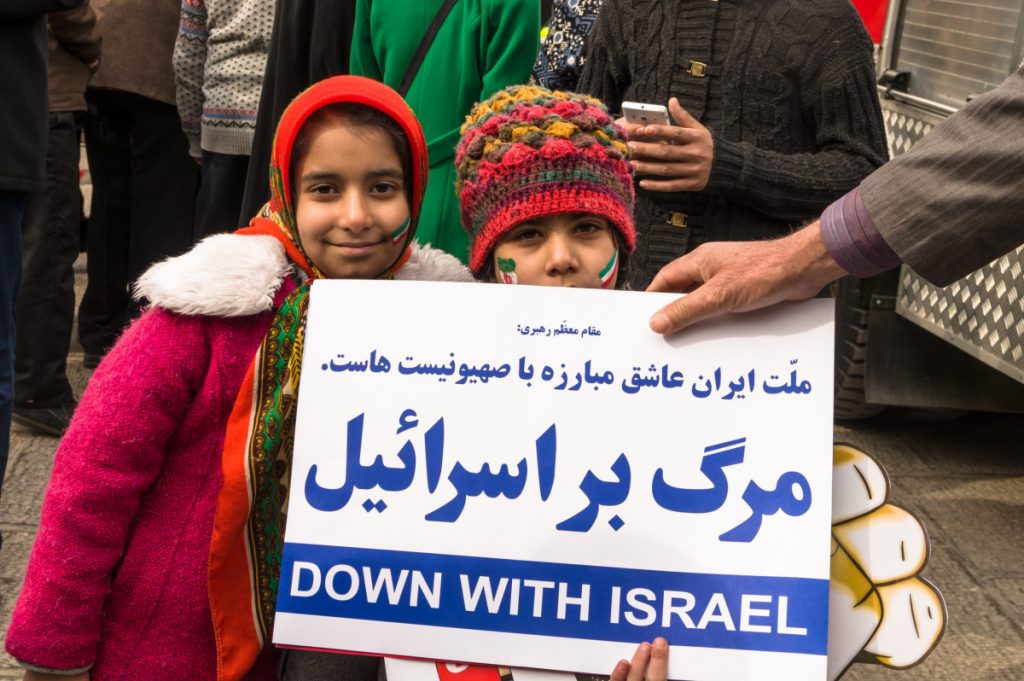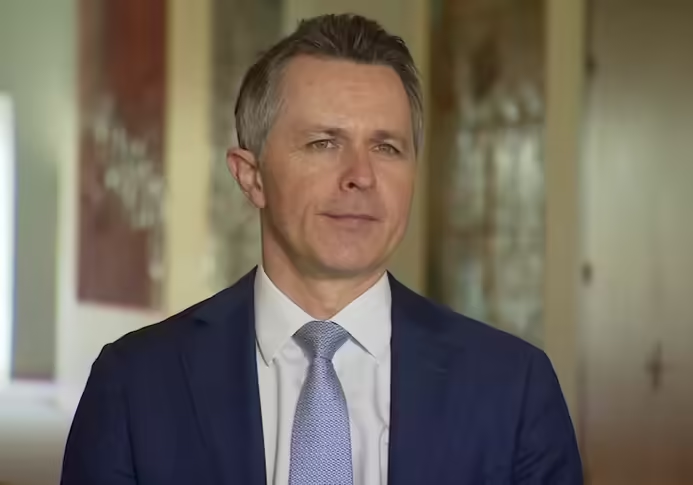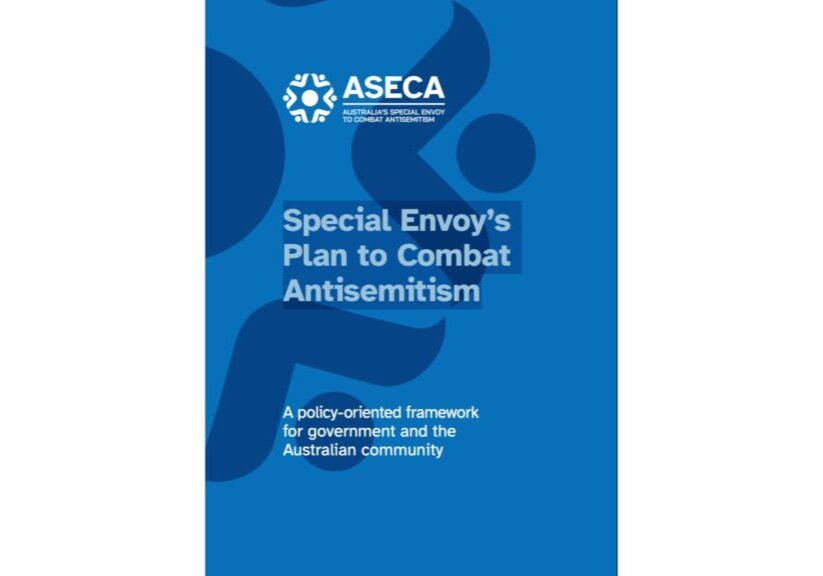Australia/Israel Review
We chanted ‘death to Israel’
Aug 1, 2022 | Marjan Keypour Greenblatt

But Iranians know who their real enemy is
“Tell me something I don’t know about Iran.” The question hit me hard, coming from Yair Lapid, the acting Prime Minister of Israel, as we sat in the small conference room outside his office in Jerusalem. Lapid is the head of a country with an all-consuming focus on the Islamic Republic of Iran. And there’s a good reason for that.
For more than four decades, Israel has had to grapple with a hostile enemy ferociously committed to the annihilation of the Jewish state. Long before he overthrew the Shah, Ruhollah Khomeini encoded the destruction of Israel as an essential element in his revolutionary creed. Today that enmity has been institutionalised in nearly every dimension of Iranian policy: military doctrine, religious affairs, energy policy, foreign affairs, education and even entertainment.
Much like classic antisemitism that blamed the Jewish people throughout history, the regime portrays the Jewish state as the ever-present scapegoat for all the ills of the world. This seething hatred is more than an existential threat to Israel; it is an existential element of the rationale for the Islamic Republic, one that props up a corrupt and feckless leadership that long ago lost any vestige of legitimacy.
But Lapid certainly already knew that. As a human rights activist and an Iran watcher, I was familiar with the regular reports of Israeli intelligence services’ daring exploits deep inside the country.
I was part of a delegation of the US Anti-Defamation League, led by my husband, Jonathan Greenblatt, and I was an approved guest of the Prime Minister’s office. As I processed the question, I initially thought there was not much insight that I could offer in response to the Prime Minister, who was intrigued by my Iranian background. And yet, I knew that I had a profound conviction that I wanted to share and did not want to lose the special opportunity to answer this most important question.
“Mr. Prime Minister, you should know that the people of Iran don’t share the hatred of Israel that is forced upon them by their regime.”
His eyes lit up. I could hear the seat leather cracking as his advisers leaned forward and focused their attention on the corner of the table where I was seated. So, I continued.
“The public knows that the source of their suffering is not the state of Israel, but rather the repressive regime that seeks to control and dominate nearly every aspect of their lives. In reality, ordinary people admire Israel. Some of them even love the Jewish state.”
I proceeded to explain the perspective founded on my years of engagement with dissidents and my personal experiences living in Iran.
As a child growing up in post-revolution Teheran, I started every school day by standing outside in a line with other girls. After the fall of the Shah, school had become an apartheid-like environment with students entirely segregated by gender and an Islamic dress code imposed on young girls regardless of our religion. Even as a Jewish person, every day I made sure my hijab was tied tightly around my chin to hide even a hint of hair in compliance with the modesty rules imposed by the clerics who sought to control all aspects of our lives. Before we sat down at our desks, we were compelled to shake our fists and chant in unison, “Death to Israel!” That this came before grammar or math was a clear indication of the priorities of the Iranian educational system. Throughout my teenage years, anti-Zionism was burned into my mind, a staple of every single school day.
I never believed this propaganda, not only because I come from a Jewish family. Most of us did not, because these were not our words. But we experienced a kind of collective brainwashing firsthand as hate was pounded into our heads. Every single day. And yet most of us could not find Israel on a map, knew nothing of the Arab-Israel conflict, and could not understand how this distant place connected to our lives.
Because it didn’t.
In fact, we were preoccupied with far more pressing problems like avoiding the overnight bombardments of the Iraqi Air Force during the Iran-Iraq war in the 1980s, or managing the food rations and the general unavailability of basic nutrition, let alone choosing our own clothing or finding ways to listen to music that suddenly had been banned. While anti-Israel propaganda undoubtedly seeped into many young minds because of the constant repetition, it mostly fell on deaf ears. We disregarded it because, as war invaded our lives and poverty spread, Israel literally was among the farthest things from our minds.

A series of social media campaigns has allowed Iranians to express their true, positive, feelings about Israel (Image: Twitter)
The quiet scepticism has broken through the surface in recent years, thanks mainly to social media. Anonymous activists have used platforms to push back on the propaganda with growing success. For example, #NoHateDay has become a dynamic grassroots movement on social media, launching a flurry of positive messages designed to counter the tired programming of “Quds Day,” an artificial event created by the regime to attack the Jewish state. New campaigns are constantly emerging such as #StandsWithIsrael and #IraniansLoveIsrael, initiatives that express friendship and tolerance. Activists have designed creative graphics and banners in support of the Jewish state and filled social media with messages of friendship and peace between the two people.
Over the past four decades, Iranians have witnessed the failure of the Islamic Revolution and its inability to deliver on basic promises of peace and prosperity for the majority of the population. Although the regime ruthlessly controls the media and uses it to drive its desired narrative, Iranians see through this contrivance. Across the country people resort to VPNs, satellite media and other services to circumvent the censors and access news that they actually can trust.
For example, legions of people have tuned in for decades to hear the daily broadcasts of Menashe Amir, a long-time anchor on Israel Radio International, as well as others on Israel’s Pars TV. While the regime endeavours to demonise Israelis, ordinary Iranians know that Amir’s reporting and analysis out of Israel is far more informative than what is provided by state-approved anchors in Teheran. Persian-language accounts and those of other diaspora outlets such as Iran International, ManotoTV and VOA Persian provide listeners with a more accurate and nuanced perspective on world affairs and the policies that impact their lives.
While the clerics assail the so-called Zionist regime, the Iranian people actually appreciate the many unsolicited gestures of kindness coming from Israel over the years. These have ranged from the symbolic, such as congratulatory messages during the festival of Nowruz, to the substantive, such as the humanitarian offers of aid after earthquakes and the gift of vaccines when the COVID virus seized the country. While Teheran reflexively rejected these offers, the Iranian people knew they themselves were the real victims. Time and again, the public has seen how their star athletes are humiliated, forced to abandon years of training and forfeit matches simply so that they don’t have to compete against Israeli athletes. Such acts tear at the deep sense of pride among ordinary Iranians and increasingly underscore that the official posture of the regime against Israel is hurting only them.
Over time, poverty and unemployment have increased, natural resources have been depleted and patriotism has declined. Meanwhile, thanks to social media and diaspora-based news, Iranians increasingly are aware of the regime’s mismanagement of the country. They see how, while their opportunities have diminished, opportunities have grown for Palestinian terrorists whose families are compensated by the regime when they kill Israeli civilians; for the child soldiers in Lebanon, Syria, and Yemen whose training and weapons are financed by the regime; for the drug smugglers in South America who are paid by the regime. The Iranian people see their leaders express compassion for marginalised minorities around the world, but neglect the pain and dismiss the suffering of their own people of all ethnic and religious backgrounds.
“Mr. Prime Minister, the Iranian people know that the cause of their misery is not the far-away state of Israel. It is the oppressive Iranian regime that is prioritising its destructive ambitions for Israel over the well-being of their own civilians.”
The exchange took only a few minutes, but I felt great relief in conveying this message on behalf of my compatriots. Prime Minister Lapid was gracious and also shared his amity toward the people of Iran. He closed the exchange by expressing hope for their eventual liberation from oppression – a hope that all freedom-loving people can get behind.
Marjan Keypour Greenblatt is a human rights activist and founder of StopFemicideIran.org, and ARAMIran.org. She’s a non-resident fellow at the Middle East Institute and member of ADL’s Task Force for Middle East Minorities. © Times of Israel (www.timesofisrael.com), reprinted by permission, all rights reserved.
Tags: Antisemitism, Iran, Israel






